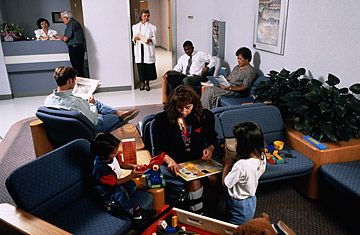
Doctor asks, "Why did you come to the ER today?"
This question — emphasizing today is common practice in emergency departments — helps us figure out how urgent a patient's illness might be. But it's a loaded question. Rephrased, it could easily mean, "Do you really believe you are seriously ill, or is it just that you couldn't wait to see a regular doctor?"
Behind the sanctimony is a cliché: McDonald's medicine. Spend time in a busy ER and you'll hear a recurrent theme among the harried staff: patients in the U.S. want their health care like they want their food — served up speedily and made "your way." According to the conventional wisdom among medical professionals, overcrowding in the ER is exacerbated by America's culture of instant gratification.
Whether or not you buy that theory, it's clear that convenience has become an important part of the way people think about health care. CVS offers customers walk-in health facilities called Minute Clinics. Some ERs use a pizza-delivery approach to advertise care — if you're not seen within an hour, you win free movie tickets — while others have even experimented with drive-through ERs.
The prospect of waiting for health care is not only distasteful to Americans; it's downright threatening. Indeed, the specter of Canadian-style waiting lists for certain tests and procedures evoked enough American-style fear that it became a key Republican talking point to challenge the concept of government-subsidized health care.
O.K., so Americans don't want to wait for health care. Now the question is, Should we be asking them to? Some people might actually be better off waiting for "urgent" care; many, if not most, symptoms that propel people into the ER and doctors' offices improve without medical attention, including cold, cough and sinus symptoms that mostly are caused by viruses. Avoiding unnecessary medications, like antibiotics when you don't need them, and invasive tests, like CT scans, also means reducing the risks of drug side effects and exposure to potentially cancer-causing radiation.
Your insurance company also doesn't want you to use an ER unless you absolutely need to — the bill they pay for your ER visit is more expensive than if you're seen in a clinic. Which is why they use economic disincentives like high co-pays for ER care. That approach is based on the finding, by the Rand Corp.'s Health Insurance Experiment, that when there are no barriers to using additional medical care, people will seek more care (and will use the ER more frequently), even when extra services don't really improve health.
The real question becomes, Would it be feasible to implement a reasonable waiting time for "urgent" conditions? Would it really help decrease patients' unnecessary use of medical care using a wait-and-see approach? It might work for patients with a short list of select conditions — such as minor coughs and colds — but in many other cases, it probably wouldn't be fair to expect people to know whether their symptoms indicate something serious or a condition that will pass.
Take, for instance, that painful, swollen knee that is a little worse today? It's probably not life-threatening, but what if you need crutches? Should you wait two weeks to see a primary-care physician during regular business hours (which requires taking a day off work)? After that, you'll probably have to go for X-rays (another day off), and finally go back again (another day) to get the results. Seems pretty inefficient. Alternatively, you can head down to the local ER to get it checked after work.
How about that nagging hernia? It hurts a bit more than usual today, and it's Friday night: doctors' offices are closed. If you call your doctor, she (or her nurse) may very well send you to the ER anyway. An answering service may even recommend dialing 911 if you think it's an emergency.
Perhaps the root problem isn't Americans' impatience for care, but the fact that many are stuck navigating a system that has done a poor job making sense of time and health. The current system for many people (depending on who their doctor or their insurer may be) is not really set up to help triage acute medical-care needs.
That's where doctors can help. We need to communicate more clearly the key difference between two concepts: severity and urgency. A condition can be serious but not that urgent. Consider cancer: the disease can be very serious and may even take your life, but whether we run every test and start the treatment today may be less important than which treatments we pick and how we coordinate your care.
Of course, there are legitimate reasons for insisting on prompt care today: delays in treatment for some conditions — such as heart attacks, strokes and lung or bloodstream infections — significantly increase your risk of death.
In the end, is ultraconvenient, superquick McDonald's-style medicine a good or bad thing? It's hard to say: a major difference between McDonald's and medicine is that it's easy to know whether you want a Big Mac today, but it's much harder to know whether you need a doctor today. The good news is that convenient care clinics do not appear to be dispensing wrong care (like antibiotics for conditions that don't require them), at least any more than ERs or primary-care doctors.
But the truth is that we still have a long way to go before health care providers can talk about the concepts of time and health from a rational and evidence-based perspective. Until then, who really wants to wait?
Dr. Meisel is a Robert Wood Johnson Foundation clinical scholar and an emergency physician at the University of Pennsylvania.
Dr. Pines is the director of the Center for Health Care Quality, an emergency physician and an associate professor of emergency medicine and health policy at George Washington University Medical Center.
